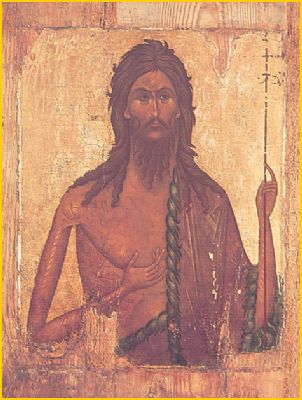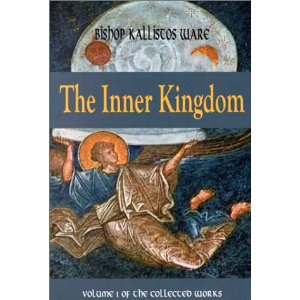|
|||
|---|---|---|---|
| This weekly bulletin insert complements the curriculum published by the Department of Christian Education of the Orthodox Church in America. This and many other Christian Education resources are available at http://dce.oca.org. | |||

Jesus describes Saint John the Baptist in Matthew 11: 2-20. He calls John "more than a prophet" and says John is the "messenger" written about by the prophet Malachi. Jesus goes on to "upbraid the cities where most of His mighty works had been done, because they did not repent." That word "repent" is often associated with John, who began his ministry with the same words Jesus used as He started to minister: "Repent, for the Kingdom of God is at hand!" If you asked a number of people what the word "repent" means, and what Jesus Christ and John were calling their hearers to do, several answers would probably be offered. Some people believe that the word "repent" is a warning that we need to change our ways not out of love and respect for God, but in order to escape the punishment that He has vengefully planned for those who fall into sin. Others would say that to repent is to acknowledge that we are hopelessly entangled in sin, with no means of escaping the wrath of our angry Maker. Bishop Kallistos Ware writes about the Orthodox experience of repentance in the first volume of his collected works, entitled "The Inner Kingdom." There he reminds readers that a view of repentance which only involves lamentation, despair, or fear of God's retribution is at best incomplete and at worst seriously wrong. He writes, "To repent is to look, not downward at my own shortcomings but upward at God's love; not backward with self-reproach, but forward with trustfulness. It is to see, not what I have failed to be, but what by the grace of God I can yet become." Bishop Kallistos stresses the fact that God wants to forgive, not punish. This is emphasized by the Church's description of Christ as the "physician of souls" who knows very well how weak and prone to sin we are, and who stands ready to "blot out our transgressions" (in the words of the Lenten hymn) if we repent of them. 
The Church helps us repent through the Sacrament of Confession. As Bishop Kallistos points out, neither the person confessing nor the priest hearing the confession is central in this sacrament. The absolution we receive is given by Christ Himself, with the priest as witness and counselor. The bishop writes, "In common with all the sacraments, Confession involves a joint divine-human action, in which there is found a convergence and "cooperation" (synergy) between God's grace and our free will. Both are necessary; but what God does is incomparably the more important." John the Baptist addressed crowds with stirring words: "Behold, the Lamb of God, who takes away the sin of the world!" (John 1: 29). These are not the words of a grim and frowning preacher, verbally beating people up for their faults. They are words of hope, filled with wonder at the goodness and mercy of God, who responds with love to all who repent. |
|||
